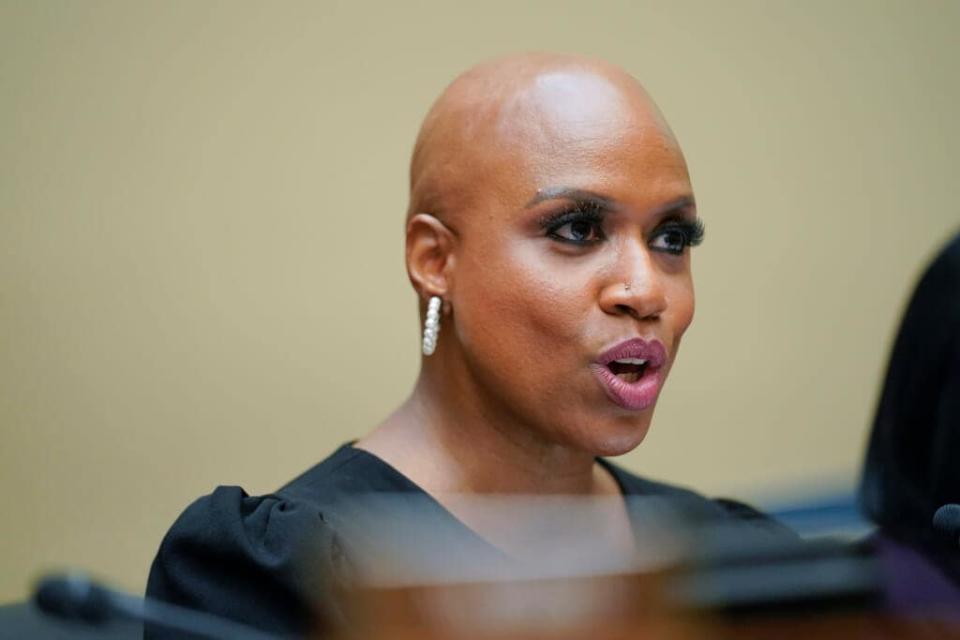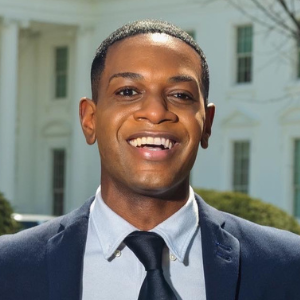Is the anti-abortion movement rooted in white supremacy?
During interviews with theGrio, U.S. Rep. Ayanna Pressley and law professor Michele Goodwin call out the embedded racism in the anti-abortion movement over the centuries.
President Joe Biden on Sunday told reporters he is looking into his legal authority to declare a public health emergency in response to the Supreme Court overturning Roe v. Wade over two weeks ago.
A group of 20 Black female members of the U.S. House of Representatives, led by Rep. Ayanna Pressley (D-Mass.), had been calling on the president to declare a national emergency due to the disproportionate impact abortion bans will have on Black women.

In an interview with theGrio, Rep. Pressley not only emphasized the statistics that Black women are more likely than white women to experience health and economic disparities related to the lack of reproductive care, but she also reminded us that the history of the anti-abortion movement is “rooted in white supremacy.”
“We’ve already endured a history of medical apartheid, of experimentation without our consent [and] of sterilization and find ourselves in a Black maternal morbidity crisis,” Pressley told theGrio. “That history of medical apartheid against Black and brown, immigrant, indigenous and disabled folks is real. It’s a traumatic history.”
The topic of abortion and racism dates back centuries, says Michele Goodwin, a law professor at the University of California Irvine and a member of the ACLU executive committee. At its core, she contends, is the desire to achieve white expansion — which is intrinsically connected to the United States’ founding and participation in the Transatlantic slave trade.
“If we read Dobbs [vs. Jackson Women’s Health Organization] as just an opinion of 2022, then we’re missing the Dobbs of the 1600s, 1700s, 1800s,” Goodwin said in an interview with theGrio. “There has been since the times of colonization in the United States, the interest in the expansion of white settlement in colonies, that was explicitly understood when colonists arrived.”
The connection between the anti-abortion movement and America’s racism is two-fold, says Goodwin, who is the author of “Policing The Womb: Invisible Women and the Criminalization of Motherhood.” There were both economic and racial motivations behind the pushback on abortion care, she added.

Popular white physicians like Horatio Storer, J. Marion Sims and Joseph DeLee in the late 1800s and early 1900s wanted to “monopolize” the field of obstetrics and gynecology. In order to do that, they formed a medical smear campaign against women, particularly Black midwives, in an effort to thwart their work in reproductive health care.
“We go from in the 1800s nearly 100% of reproductive health care being governed by women and about 50% of that being by Black women … to women basically caring for about 1% of the field by the 1900s,” said Goodwin.
In their writings, Storer, Sims and DeLee depicted Black midwives as “barbaric” and seized on the issue of abortion procedures, calling them “immoral.”
Goodwin also noted that Sims, who’s known as the father of gynecology, wrote about “torturing Black women.”
“He wrote in his own words about having epiphanies in the middle of the night, where he would then get these Black women who were chained in the back of his home and begin cutting into their uteruses,” she recalled. “He believed that Black women did not feel pain, so he did not provide them anesthesia.”
Due to the rise of the abolition movement, Goodwin said, these white physicians also wrote about the need for white women to “use their loins and go east, south, north and west.”
“They aligned themselves with a white supremacy movement,” she added.
The historical reality of the anti-abortion movement being rooted in a desire to protect the white race has a modern context. In 2019, famed educator and anti-racism scholar Jane Elliott highlighted the implications of a declining white population in a country founded on the idea that whites are superior to Black and brown people.
“Right now, white people are really frightened,” Elliott said during her interview with Black Nouveau. She referenced Ben Wattenberg, author of the 1987 book “The Birth Dearth,” who wrote that “the main problem confronting the United States today is there aren’t enough white babies being born in this country.”
“[Wattenberg] says that if we don’t change this and change it rapidly, white people will lose their numerical majority in this country,” said Elliott, “and this will no longer be a white man’s land.”

Census data showing a shrinking white population released during the administration of former President Barack Obama, America’s first Black commander in chief, has been seen as a turning point in the modern rise of white grievance politics. Elliott referenced this connection.
“Finding out now, recently, that within 30 years, white people will be in the numerical minority in this country is going to be traumatic,” she said, “and that’s the reason we have to solve this problem, and we have to solve it now.”
The day after the Supreme Court’s ruling in the Dobbs case overturning Roe, at a rally in Illinois, U.S. Rep. Mary Miller sparked outrage when she thanked former President Donald Trump for his role in what she said was a “victory for white life.” Miller’s campaign later said the Republican congresswoman misread the text of her speech, however, her flub only fueled criticisms that the conservative movement to ban abortion was rooted in white supremacy.
In response to her Republican House colleague, Congresswoman Pressley told theGrio, “We find ourselves in a moment where they’re saying the quiet part out loud.”
Another part of the fight for the pro-abortion rights movement and, by extension, the protection of Black and brown women and pregnant people is the historical dynamic between Black women and white women — and women’s rights organizations led by white women — as it relates to allyship.

As Goodwin told theGrio, “The road was paved to this moment with the harms and violence inflicted upon Black and brown women without white women allies coming to their aid or being able to see that what Black women and indigenous women and Latinas were experiencing was the preface to the novel we’re now reading, right to this moment.”
She cited cases like that of Regina McKnight, who was convicted of homicide in 2001 after suffering a stillbirth, and the arrests of dozens of Black women at the Medical University of South Carolina for admitting to drug use. Goodwin said she now worries that surveillance and criminalization of Black women in the post-Roe United States will heighten. In order to not repeat the mistakes of the past, she argued, there needs to be a level of empathy from white women about the experiences of Black and brown women.
In the days after the Supreme Court’s ruling in the Dobbs case, many white women compared the moment to the fictional dystopia of the TV series “The Handmaid’s Tale,” based on Margaret Atwood’s 1985 novel, where fertile women become the property of men and are forced into child-bearing slavery.
“It’s easier for people to understand a fiction of oppression that affects white women than understand the realities of what Black women have endured, which are written across our histories and written across the uteruses of Black women,” Goodwin argued.

“If racism had not been so embedded in law, and also our social consciousness,” she added, “then white women would have been able to see the liberation of Black women through the 13th Amendment as their liberation too.”
As the Biden White House and Democrats in Congress navigate how to respond to this moment of abortion rights being overturned, Pressley told theGrio she fears that because Black women have “been burdened by so many crises” over the years, they will “be in a state of detached acceptance and resignation because they’re just so tired.”
“We’ve always been the ones on the front lines of every movement, defending the rights of the liberties, the freedom of everyone else,” said Pressley. “It is demoralizing to have to fight so hard, to work so hard simply for your humanity to be seen, to be centered and prioritized.”
As for Democrats on Capitol Hill, Pressley said, “we don’t have the luxury of cynicism or apathy because people are depending on us to stand in the gap.” The congresswoman called the issue of abortion rights a “matter of life and death.”
“We know that Roe overturned does not mean that people will not seek health care, will not seek abortion care,” she said. “It simply means they won’t do it safely or legally.”

Gerren Keith Gaynor is the Managing Editor of Politics and Washington Correspondent at theGrio. He is based in Washington, D.C.
TheGrio is FREE on your TV via Apple TV, Amazon Fire, Roku and Android TV. Also, please download theGrio mobile apps today!
The post Is the anti-abortion movement rooted in white supremacy? appeared first on TheGrio.

